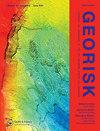GIS-Based Landslide Susceptibility Modelling in Urbanized Areas: A Case Study of the Tri-City Area of Poland
IF 4.8
3区 工程技术
Q1 ENGINEERING, GEOLOGICAL
Georisk-Assessment and Management of Risk for Engineered Systems and Geohazards
Pub Date : 2022-11-26
DOI:10.3390/geohazards3040026
引用次数: 1
Abstract
This paper presents the results of landslide prediction modelling for young glacial areas performed using statistical methods. The area in question is urbanized and therefore mass wasting activity is a matter of interest to both the local community and the authorities. The analysis was based on the 2011 ‘Register of landslides and areas prone to mass movements with a scale of 1:10,000 for the city of Gdansk’ and the 2012 incomplete ‘Register of landslides and areas prone to mass movements with a scale of 1:10,000 for the city of Gdynia’. The research took into account geological, geomorphological, hydrological, hydrogeological, and anthropogenic conditions. The landslide susceptibility map was created using the statistical landslide index. The calculated indices were used to create a map of Gdansk’s landslide susceptibility. In Gdansk, 84.50% of the total diagnosed landslide area belongs to the high susceptibility class, 14.25% to the moderate susceptibility class, and only 1.25% to the low or very low susceptibility class. After extrapolation, the data was also used to create a susceptibility map for the remaining parts of the Tri-City area, Sopot and Gdynia. The difficulty of extrapolating landslide data for neighboring urban areas was indicated. In Gdansk, which had been covered by geological mapping, the best modelling results were obtained with a large number of causal factors. In Gdynia and Sopot, for which the statistical landslide index value was extrapolated from Gdansk, the best results were obtained when selected causal factors were considered. In Sopot and Gdynia, 81.6% of the landslide area belongs to the high susceptibility class, 15.1% to the moderate class, and 3.3% to the low susceptibility class. These results emphasize a different role of some causal factor classes in the occurrence of landslides in neighboring urban areas. The resultant maps show the areas in which mass wasting is the most probable in the future.基于gis的城市化地区滑坡易感性模型——以波兰三城市地区为例
本文介绍了用统计方法对年轻冰川区进行滑坡预测建模的结果。该地区已城市化,因此大规模废物活动是当地社区和当局都感兴趣的问题。该分析基于2011年的“格但斯克市滑坡和易发生群众运动的地区登记册,比例为1:10 000”和2012年不完整的“格丁尼亚市滑坡和易发生群众运动的地区登记册,比例为1:10 000”。这项研究考虑了地质、地貌、水文、水文地质和人为条件。利用统计滑坡指数建立滑坡易感性图。计算出的指数被用来绘制格但斯克的滑坡易感性地图。在格但斯克,84.50%的滑坡诊断面积属于高易感性等级,14.25%属于中等易感性等级,只有1.25%属于低或极低易感性等级。外推后,这些数据还用于为三城地区、索波特和格丁尼亚的其余部分创建易感性图。指出了在邻近城市地区外推滑坡数据的困难。在格但斯克,它已经被地质填图覆盖,在有大量因果因素的情况下获得了最好的模拟结果。在格但斯克外推统计滑坡指数值的格丁尼亚和索波特,在考虑选定的因果因素时,得到了最好的结果。在索波特和格丁尼亚,81.6%的滑坡面积属于高易感性级,15.1%属于中等易感性级,3.3%属于低易感性级。这些结果强调了一些因果因素类别在邻近城市地区发生滑坡中的不同作用。由此产生的地图显示了未来最有可能发生大规模浪费的地区。
本文章由计算机程序翻译,如有差异,请以英文原文为准。
求助全文
约1分钟内获得全文
求助全文
来源期刊
CiteScore
8.70
自引率
10.40%
发文量
31
期刊介绍:
Georisk covers many diversified but interlinked areas of active research and practice, such as geohazards (earthquakes, landslides, avalanches, rockfalls, tsunamis, etc.), safety of engineered systems (dams, buildings, offshore structures, lifelines, etc.), environmental risk, seismic risk, reliability-based design and code calibration, geostatistics, decision analyses, structural reliability, maintenance and life cycle performance, risk and vulnerability, hazard mapping, loss assessment (economic, social, environmental, etc.), GIS databases, remote sensing, and many other related disciplines. The underlying theme is that uncertainties associated with geomaterials (soils, rocks), geologic processes, and possible subsequent treatments, are usually large and complex and these uncertainties play an indispensable role in the risk assessment and management of engineered and natural systems. Significant theoretical and practical challenges remain on quantifying these uncertainties and developing defensible risk management methodologies that are acceptable to decision makers and stakeholders. Many opportunities to leverage on the rapid advancement in Bayesian analysis, machine learning, artificial intelligence, and other data-driven methods also exist, which can greatly enhance our decision-making abilities. The basic goal of this international peer-reviewed journal is to provide a multi-disciplinary scientific forum for cross fertilization of ideas between interested parties working on various aspects of georisk to advance the state-of-the-art and the state-of-the-practice.

 求助内容:
求助内容: 应助结果提醒方式:
应助结果提醒方式:


